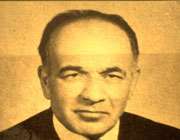Abul-Ghasem Payandeh
part 3

While Payandeh came to be regarded primarily as a translator and journalist, he remained also active in writing fiction. His first short stories appeared in Afsana, a journal of literary review published by Mohammad Ramazani, the founder of Kolala-ye Kavar Publishing House. Afsana published, exclusively, works of fiction either by contemporary foreign writers in Persian translation, or by Persian writers, noted among them Sadeq Hedayat (1903-1951), Mohammad Hejazi (1901-1974), and Saeid Nafisi (1896-1966; Tahbaz, p.181; Elahi, pp.301-05). His first novel, Qatel (Murderer), which first appeared in installments in Erfan, was published in 1934. Darsinema-ye zendegi (In the cinema of life), a collection of nineteen short stories was published in 1957. It did not attract much critical notice until the renowned poet, Ahmad SHamlu (1925-2000), in a review article in Sepid o Siah, a weekly magazine published by Ali Behzadi, praised the collection as a literary masterpiece and the best collection of short stories ever published in Persian (Behzadi, pp. 137-38). The revised edition of the collection, entitled Morda-keshan-e Jowzan (The Corpse-bearers of Jowzan) was published in 1967. In Jenab-e aqa-ye doktor rish (His Excellency Dr. Beard, 1969), Payandeh throws a light on the barely visible aspects of medical malpractice in Iran. In 1968 he published Defa az Molla Nasr-al-Din (In defense of Molla Nasreddin), a collection of twelve short stories. Zolamat-e Edalat(The dark abyss of justice), a collection of fourteen short stories, in which fictional characters are subsumed by socio-cultural implications, appeared in 1975. His skillful adoption of an eloquent and yet an entertaining language in these collections, is reminiscent of Mohammad-Ali Jamalzada’s (q. v.) prose in his earlier works, particularly in Yeki bud yeki nabud (Once Upon a Time, Berlin, 1921; Mirت؟abedini, 1, p. 198).
In general, as contended by a critic, Payandeh’s fictional works shun character delineation and elaborate plotting. Often replete with Arabic phrases, and infused by his poignant criticism of the country’s social and political institutions, his novels and short stories are characterized instead by a haphazard combination of memoirs, reports, and sermons (Mirabedini, I, p. 199)
Source: Wikipedia&Encyclopedias
Other Links:
Saeed Nafisi, one of the remarkable characters in the literary field (Part 1)
Saeed Nafisi, one of the remarkable characters in the literary field (Part 2)
Edward Fitzgerald (part 2)